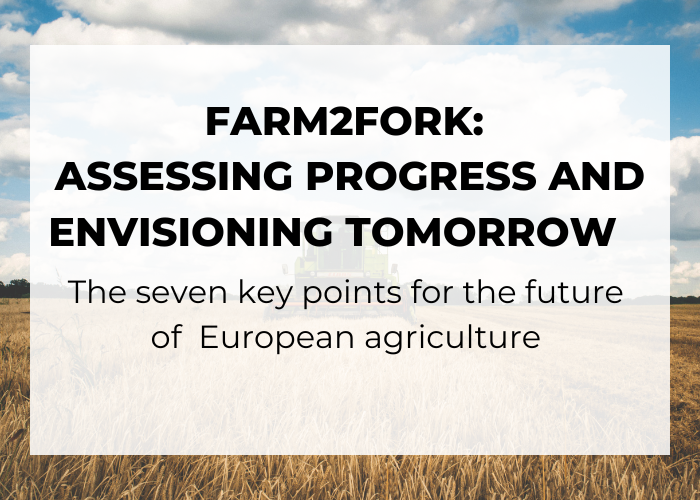The seven key points for the future of European AgriculturePRESS RELEASE
- 10 April 2024
- Posted by: Competere
- Categories: Commodities, events, highlights, News

Leggi il comunicato stampa in italiano
THE SEVEN KEY POINTS FOR THE FUTURE OF EUROPEAN AGRICULTURE
***
Brussels , 10th April 2024 – Agriculture and food must return to the center of the European political agenda. In a realistic way and without any ideological prejudice. This is the message sent by the main representatives of the European agrifood industry today. They took part in a conference at the European Parliament entitled “Farm2Fork: Assessing Progress and Envisioning Tomorrow”, organized by the policy Institute Competere.Eu, specialized in public policies on sustainability, in collaboration with MEP Salvatore De Meo (EPP).
“Five years after the launch of the European Green Deal, the ambitions that inspired it have often proven to be inconsistent and, in worse cases, supported by an ideological approach that risked compromising a model supply chain such as our agrifood continent.” Pietro Paganini said.
These are the representatives of the supply chain which participated in the event:
Andrea Bertaglio (Carni Sostenibili), David Brussa (Illycaffè), Shane Brennan (Gcca), Anna Cane (Assitol), Sossio Chierego (Circolo Esperia Burssles), Valerio Forconi (Trane Technologies), Enzo Barbi (Federdoc), Horst Heitz (SMEConnect), Antoine Hoxha (Fertilizers Europe), Sara Lamonaca (Food&DrinkEu), Conor Mulvihill (Dairy Industry Ireland), Paolo Patruno (Clitravi) e Garlich von Essen (Euroseeds).
“Those who make the laws must finally understand that sustainability has three faces, not only environmental, but also economic and social”, said Salvatore De Meo, MEP (PPE Group).
However, in recent years we have mainly seen legislative proposals coming from the European Commission steeped in ideology, lacking in pragmatism and based on erroneous, dated or often non-existent impact assessments. Instead, we must base ourselves on the facts, and change this narrative that sees farmers demonized and accused of being primarily responsible for climate change. Agriculture is a fundamental sector, which has demonstrated its resilience during the pandemic and which must be the starting point for the green transition. The new policies must be made with farmers and not against them, because only through their involvement and full participation will we be able to achieve the environmental objectives we have set ourselves.
“In the last five years we have seen a marginalization of agriculture and of the food industry on the European political agenda, despite their crucial role in food security, innovation and socio-economic development. Environmental policies have often penalized the sector, ignoring the need for a balanced approach that takes into account the economic, social, and environmental dimensions of sustainability”, Pietro Paganini said.
During the debate it emerged how current policies, characterized by rigidity and lack of scientific pragmatism, have failed to respond to emerging challenges such as the pandemic and geopolitical crises, putting the competitiveness and sustainability of the sector at risk. Furthermore, the excessive emphasis on green-tech solutions has been misleading, given that these solutions alone are not sufficient to address global food-related challenges.
The actors of the Agrifood industry therefore ask for a concrete commitment from future representatives in the Parliament and European Commission.
Their appeal is summarized in seven points:
- Recognize the priority of the agricultural and food sector on the European political agenda.
- Develop policies that promote the well-being of European citizens and support resilient global supply chains.
- Guarantee a balanced food policy that takes into account health, the environment and the economy.
- Stimulate innovation and investments in the Agrifood sector.
- Replace subsidies with active investment policies to revitalize rural areas and improve access to credit.
- Promote the European Agrifood sector internationally through product protection strategies and commercial partnerships.
- Engage in consumer food education to promote balanced diets and support local products.

